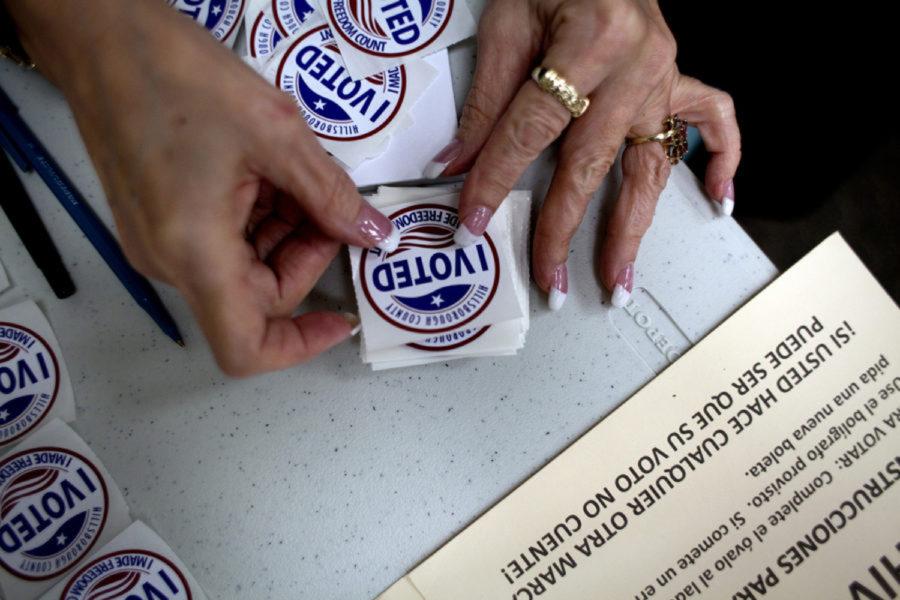Editorial: Adopt paid Election Day nationwide
A poll worker gets “I Voted” stickers ready to hand to voters as they finish up at the ballot booths.
February 10, 2019
Sandusky, Ohio, a city of about 25,000 inhabitants, decided to trade Columbus Day for Election Day as a way of highlighting the importance of voting and voting rights.
The first Tuesday of November, and not Columbus Day, will now be a paid holiday for the more than 200 government employees working in the area, and the city hopes that local businesses will also adopt the practice. Sandusky’s new policy is an excellent idea that will hopefully improve voter turnout, and the rest of the country should follow its lead.
The decision to make a paid holiday out of Election Day wasn’t just motivated by a desire to expand voting rights in Sandusky. City manager Eric Wobser also tied the move to people’s perception of Columbus Day.
“Ultimately, we knew that Columbus Day was a day that all of our citizens couldn’t necessarily be proud of celebrating,” he told The Washington Post. “One of the things we’re doing is to begin to celebrate and build on the strength that is our diversity. Columbus Day was not a way for us to show that we value our diversity.”
There has been talk for years of the legitimacy of celebrating Columbus Day, since the Italian explorer perpetrated the genocide and slavery of indigenous peoples. A good replacement for the holiday commemorating such a controversial person is one that promotes civic duty and diversity.
There has also been talk lately of a bill at the federal level that would make Election Day a national holiday. The same bill would also forbid voting rolls from being purged and provide several checks on campaign financing, plus the stipulation that all presidential and vice presidential candidates must release their tax returns.
Although Pew Research Center data tells us that 71 percent of Democrats and Democratic-leaning independents and 59 percent of Republicans and Republican-leaning independents support creating a federal holiday out of Election Day, the argument has become extremely partisan on Capitol Hill. Democrats laud the bill as a positive and necessary step towards giving the power to vote to all Americans, while Republican Senate Majority Leader Mitch McConnell called it a “power grab.”
McConnell’s claim couldn’t be further from the truth, and Democratic lawmakers like Sen. Kirsten Gillibrand, D-N.Y., took him to task online about it.
“Voting isn’t a ‘power grab,’” Gillibrand tweeted. “It’s democracy, and it’s literally the entire point of our representative government.”
The United States is far behind other world democracies in this respect. According the Pew Research Center, 27 of the 36 member nations of the Organization for Economic Cooperation and Development hold their elections on the weekend, while the other nine — including the United States — hold theirs on a weekday. Israel’s and South Korea’s election days are national holidays.
Of the 36 OECD countries, the United States ranks 26th in voter turnout, which according to a survey by the U.S. Census Bureau, may be due to the day of the week Election Day falls on. Of the 19 million registered voters who didn’t vote in the 2016 general election, 14.3 percent cited busy schedules as their excuse for not voting.
It’s our government’s duty to make voting as easy as possible for as many people as possible to ensure we have a functioning democracy. And adopting Election Day as a national holiday instead of Columbus Day is a step in the right direction.








